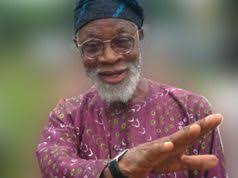Entertainment
Akinwumi Isola Enriched Yoruba Literature – Okunoye

The Head, Department of English, Obafemi Awolowo University, Ile-Ife, Prof. Oyeniyi Okunoye, has described deceased writer, Prof. Akinwumi Isola, as a compelling force in contemporary Yoruba literature.
According to Okunoye, Isola’s passage means a lot to those who appreciate the contributions that he made to Yoruba Studies and contemporary Yoruba cultural production.
He said in a tribute, “He was very versatile: a teacher, a scholar, a writer, an actor, a translator and a promoter of the study of African languages. As a scholar, he brought cosmopolitan rigour to the study of Yoruba literature. This is what he has in common with the likes of Wande Abimbola, Ayo Bamgbose, Adeboye Babalola, Olatunde Olatunji, Oludare Olajubu and others who pioneered Yoruba Studies. His book-length study of the craft of Yoruba novelists is a ground-breaking scholarly effort, which proves his proper grounding in formalist critical practice.”
Okunoye added that as a writer, Isola brought to Yoruba writing a great deal of influence from his exposure to other literatures.
“His best known work is probably O Le Ku, a play that has enjoyed enduring appeal among students of Yoruba and those who have encountered its screen adaptation.
“His poetry also evinces striking experimentation and a bold exploration of themes that are not common in traditional Yoruba poetry. “His poetry has a lot in common with the work of Adebayo Faleti, his close associate and friend who also passed away last year. In a sense, the two writers so enriched Yoruba literature and filmic tradition that they confirmed Abiola Irele’s argument on the capacity of Yoruba culture to draw from various traditions and consequently enrich itself with the borrowed values.
“Most people who did not encounter his written works would have watched him in Saworoide and AgogoEewo, both of which project his commitment to the use and promotion of Yoruba language.
Akinwumi Isola will be remembered for his commitment to promoting excellence in the teaching and use of African languages.”







